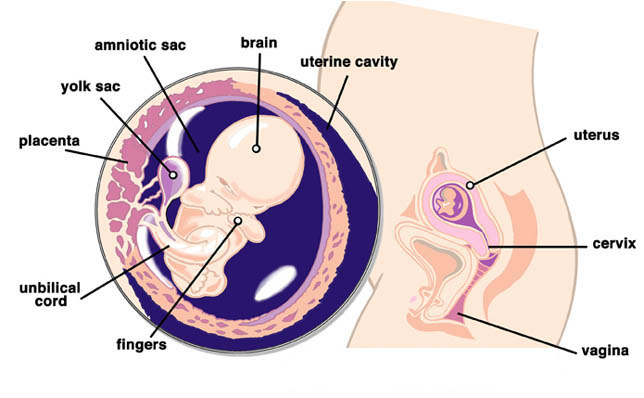10 Weeks Pregnant
Related Articles
External Links
- This article has no external links.
Your baby at 10 weeks pregnant
Continuing to grow at a rate of knots, your baby is now nearly 4cm long. Inside that little body, bones and cartilage are developing and the limbs are even beginning to form ankle and knee joints. Did you know that the elbow joint is already working? The shape of the head is still very different to what we are familiar with; the forehead protrudes outwards and is positioned very high on the head. As the pregnancy progresses, the head will become rounder. As if there weren't enough achievements to add to the list, your baby can now urinate too.

How you are feeling at 10 weeks pregnant
Have you noticed a funny metallic taste in your mouth? This is actually quite common amongst pregnant women, and some second-time mothers say that it was this symptom that alerted them to being pregnant again, having experienced it first time around. You can probably guess at the culprit: hormones. You might find that the taste is alleviated by eating acidic foods such as citrus fruits or food marinated in vinegar which will cut through the acid and help you to produce more saliva, washing the taste from your mouth.
By now, it is quite likely that the less pleasant symptoms of pregnancy (such as nausea and fatigue) might be wearing you down, but stay positive as you are nearing the end of your first trimester and it is likely that you will lose these undesirable side effects quite suddenly around week twelve or thirteen. While you might be experiencing a slight thickening around your waist, you may well be showing no change at all in this area just yet. Either way, try to enjoy each and every change to your body. One way to do this is to keep a diary with measurements or photos of your tummy throughout your pregnancy.
What you need to do at 10 weeks pregnant
While rest is extremely important during pregnancy, and worth making the most of if this is your first child, so is exercise. Most exercise that you were doing before your pregnancy is safe to carry on for as long as it feels comfortable. Later in pregnancy, as your bump grows, switching from higher impact exercise such as jogging to something more gentle, such as swimming, is a good idea. Don't worry if you weren't a keen sportswoman before your pregnancy; it is a good idea to take up some form of gentle exercise now and include it in your daily routine (where possible) for at least thirty minutes. Do make sure that you seek advice from your doctor or midwife before starting anything new.
Exercise is usually encouraged during pregnancy because the benefits are clear. As contradictory as it may sound, a little exercise tends to give you more energy rather than making you more tired; it is also likely to help you to sleep better at night. While exercise is no guarantee of a quick and easy delivery, women who have maintained a regular exercise routine through their pregnancy tend to have a shorter and less complicated labour.
| << 9 Weeks Pregnant | 11 Weeks Pregnant >> |